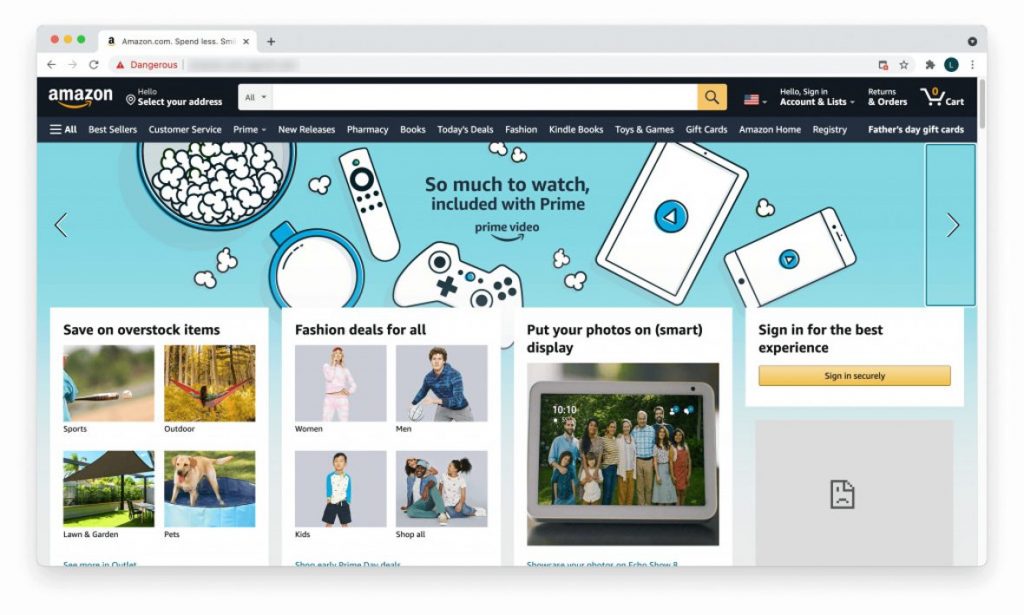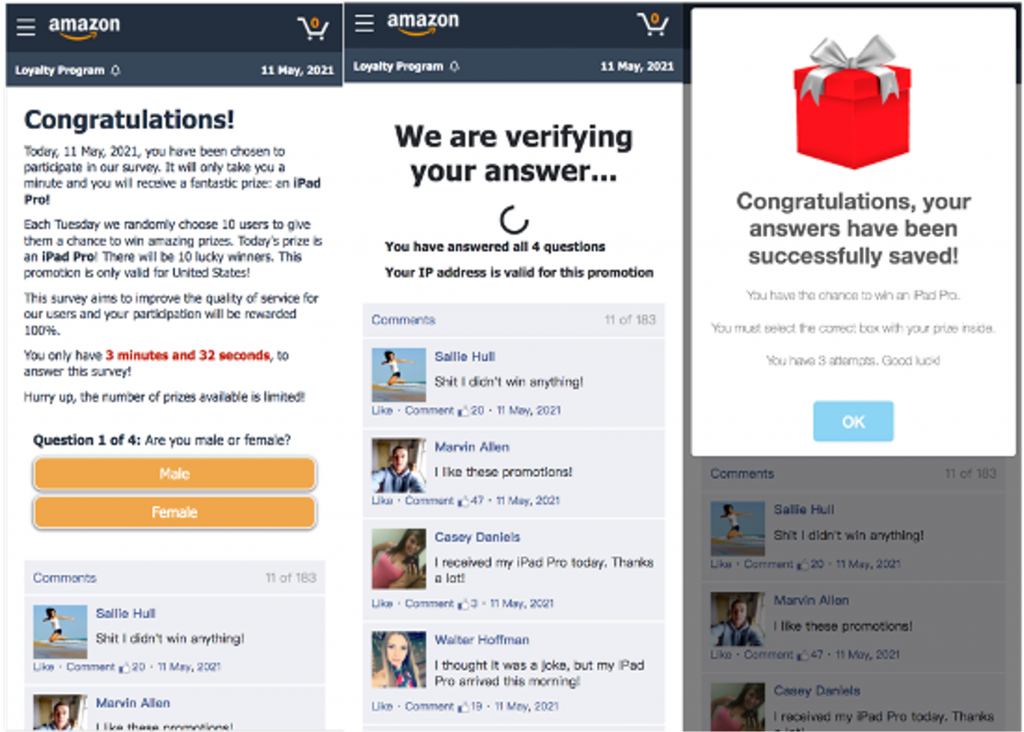Last Updated on September 25, 2025
The fall 2025 Amazon Prime Day event is scheduled for October 7 and 8. Although as you’re preparing to save some serious cash on some great deals, scammers are preparing to do everything they can to steal your money and personal data.
We can’t know for sure exactly which specific angles the scammers will take with their scams this year, but we do know three of their most preferred tactics. Keep on reading to learn about the three most common Amazon Prime Day scams and how to protect against them.
Scam #1 — Fake Amazon Websites
Around the time of Amazon Prime Day, scammers love to create copycat versions of the Amazon website, hoping to trick people into spending their money on them rather than the legitimate Amazon website.

At first glance, it’s nearly impossible to tell a fake version apart from the legitimate one, but a surefire way to know you’re shopping safely is to check the website’s URL. The URL of the legitimate Amazon US website is www.amazon.com — any site posing as Amazon that doesn’t have this URL is controlled by scammers.
It goes without saying, but don’t purchase anything from any fake Amazon websites. Your goods will never arrive and the scammers will record any personal and financial information you enter on the site.
Scam #2 — Amazon Phishing Text Messages
Another mega common scam type that always sees increased activity around Amazon Prime Day is phishing text messages. The content of the messages will vary, but they will always include a phishing link. The link will lead to a malicious, scammer-controlled website designed to steal your money and/or personal data.
Here are some examples of Amazon phishing text messages we’ve observed in the past:
- Fake Amazon Prime Issues
– You won’t be able to watch all your favorite Amazon Prime shows until the payment issue has been fixed {URL}
– Dear Maryjulie. Your Amazon Prime subscription is having billing issues. Fix it by updating your billing information: {URL}
– Hi Mary. Your Amazon Prime account is having payment problems. Fix it by updating your billing information: {URL} - Fake Amazon Rewards
– Rick, you still have $150 Amazon Bonus credit: w1fbv{.]info/(URL) See what you can buy before it expires on 03/23
– FINAL NOTICE: Wil, please confirm the details for shipment ID: AmazonRewards J62H8 here: <URL> Description: $110 bounty - Fake Payment Notification
– Dispatched: Dear Customer, Credit Card – Amazon Pay ICICI Bank Credit Card for ICICI Bank Acct XX3009 is sent by Blue Dart Courier, AWB 38534781552 on 09-JUN-21. Track status at <URL> - Fake Package Delivery
– Delivered: Your Amazon package with Mayfair Games CN3025 Catan: Junior and 1 other item was delivered. More info at <URL> - Fake Amazon Raffle
– Amazon: Congratulations Clifford, you came in 1st in this week’s Amazon pods raffle! Click the link to : <URL>
No matter which text message you receive, if you click on the embedded link you will be taken to a fake online survey page that will promise you some sort of gift if you complete the survey.

After completing the survey, to receive your gift (which doesn’t exist), you will need to enter your personal and financial information. If you do so, you’ll be handing all your information directly over to the scammers!

Scam #3 — Fake Prime Day Promotional Tie-ins
The scammers use phishing text messages as part of this scam, too. However, instead of directing people to fake surveys, these messages make reference to Amazon Prime Day, while directing people to completely unrelated scam websites. Once again, these websites are designed to steal people’s money and/or personal data.
Here are three examples of such phishing messages:
– The Prime Day sale starts early, get up to 30% off on The MeatStick the best meat thermometer, hurry before it runs out! {URL}
– Prime Day Starts Today with Smart for Life! Save up to 30% on select items and get double the Smart Points for your purchase. SHOP NOW! {URL}
– TGIF, it’s Simple Cell! Get early access to 15% off all items before Amazon Prime Day. Use code 15OFFNOW at checkout> {URL}
Some of the scam websites the links lead to:

5 Tips for Avoiding Amazon Prime Day Scams
- NEVER click on links or attachments from unknown sources. Use Trend Micro ScamCheck to detect scams with ease!
- Always double-check senders’ mobile numbers/email addresses and websites’ URLs.
- If in doubt, reach out to Amazon’s customer support team through www.amazon.com.
- Watch out for too-good-to-be-true offers — they’re always a major red flag.
- Be cautious — these Amazon Prime Day scams are everywhere, so keep an eye out.
If you want an easy and quick way to detect scam websites in real time, look no further than Trend Micro ScamCheck!
ScamCheck: Your All-in-One Defense Against Scams
Available for both Android and iOS, Trend Micro ScamCheck offers comprehensive protection from deceptive phishing scams, scam and spam text messages, and more:
- Scam Radar: Stay ahead of scams with early warnings before you’re at risk.
- Scam Check: Instantly analyze emails, texts, URLs, screenshots, and phone numbers with our AI-powered scam detection technology.
- SMS Filter & Call Block: Say goodbye to unwanted spam and scam calls and messages. Minimize daily disruptions and reinforce your defenses against phishing.
- AI Video Scan: Detect face-swapping scams in real-time during video calls, alerting you if anyone is using AI to alter their appearance.
- Web Guard: Surf the web safely, protected from malicious websites and annoying ads.
To download Trend Micro ScamCheck or to learn more, click the button below.
If you’ve found this article an interesting or helpful read, please SHARE it with friends and family to help keep the online community secure and protected. Also, please consider clicking the LIKE button or leaving a comment below.
